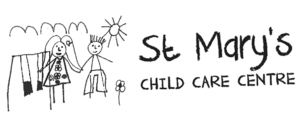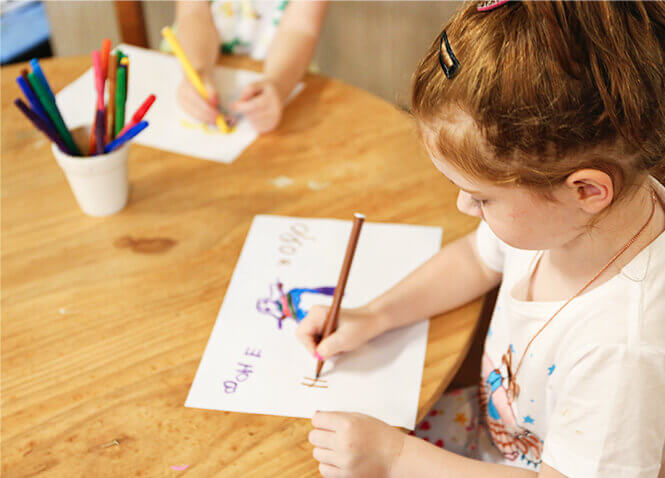
Curriculum & Policies
Our commitment to Early Childhood Education

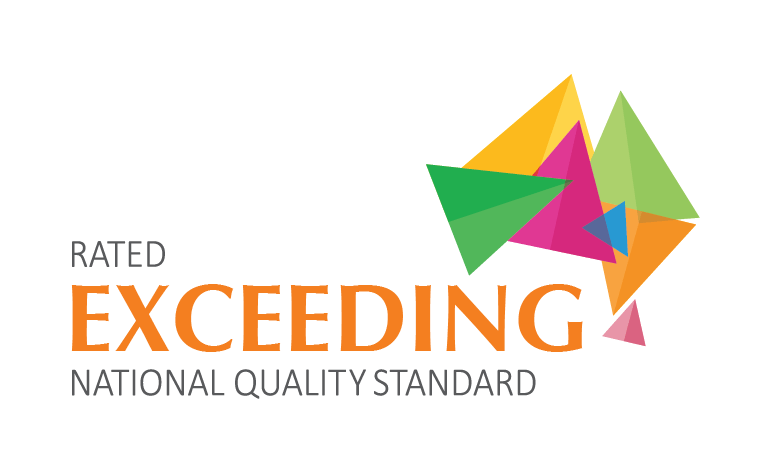
In July 2019 we were awarded "Exceeding" the National Quality Standard. This rating is testament to our commitment, our team, and the overall culture and operations within St Mary's. In fact, we have now held the exceeding rating since 2014, something we are extremely proud of.
For more information on the assessment and rating process click here
In July 2019 we were awarded "Exceeding" the National Quality Standard.
This rating is testament to our commitment, our team, and the overall culture and operations within St Mary's. In fact, we have now held the exceeding rating since 2014, something we are extremely proud of.
For more information on the assessment and rating process click here
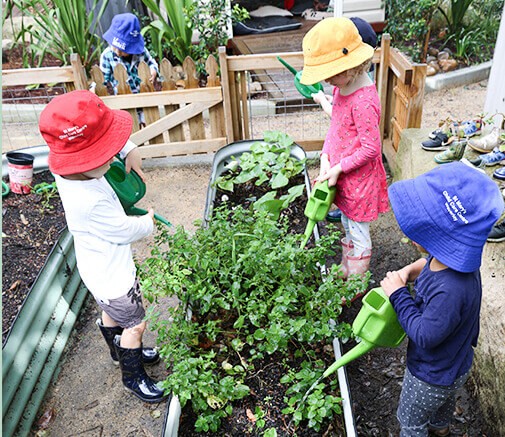

Our Curriculum and Policies are guided by:
- The National Quality Standards
- The Early Years Learning Framework
- The Code of Ethics
- The United Nations Convention on the rights of the child
- The Education and Care Services Regulations
Our policies are based on best practice, research, educational theory and practice. They provide a sound framework in which families, staff and children can interact co-operatively and equitably. Families are invited to share in policy development and evaluation.
The National Quality Standard (NQS) is a key aspect of the National Quality Framework (NQF) and sets a high, national benchmark for early childhood education and care services in Australia.
- Educational program and practice
- Children’s health and safety
- Physical environment
- Staffing arrangements
- Relationships with children
- Collaborative partnerships with families and communities
- Leadership and service management
What is the National Quality Standard Assessment process?
Services are assessed and rated by their regulatory authority against the NQS, and given a rating for each of the 7 quality areas and an overall rating based on their results.
Why is the assessment process important?
The assessment process provides valuable external feedback to early childhood services, including areas of strength and opportunities for improvement.
What is the Early Years Learning Framework and how does it relate to the Standards?
The Early Years Learning Framework describes the principles, practice and outcomes essential to support and enhance young children's learning from birth to five years of age, as well as their transition to school.
What are Quality Improvement Plans?
An important part of the standards is the requirement for services to develop ongoing Quality Improvement Plans (QIP)
The aim of a QIP is to help providers self-assess their performance in delivering quality education and care and to plan future improvements. The QIP also helps the regulatory authorities with their assessment of the service. A QIP helps providers to document the strengths of their services and to recognise areas for improvement..
The Quality Improvement Plan must:
- Include an assessment of the quality of practices of the service against the National Regulations and National Quality Standard
- Identify areas the provider considers may require improvement
- Contain a statement about the philosophy of the service
St Mary’s Child Care Centre develops our QIP in consultation with staff, families and children. Children are consulted for development of curriculum, activities and playground changes and parents are consulted in relation to events at the centre, feedback towards curriculum, playground/environment changes. To view a copy of our QIP it is located in the hall way in the Kookaburra room
The Early Years Learning Framework is an early childhood curriculum framework, which will guide early childhood educators in developing quality, early childhood education programmes. The framework describes the principles, practice and outcomes to support and enhance young children's learning from birth to five years, as well as their transition to school. This will help ensure consistency in the delivery of learning programmes around Australia.
How will the framework help my child?
The Early Years Learning Framework underpins universal access to early childhood education and has been included in the National Quality Standard to ensure delivery of nationally-consistent and quality early childhood programmes across the country.
What are the key elements of the framework?
The Early Years Learning Framework has a strong emphasis on play-based learning. The framework also recognises the importance of communication and language (including early literacy and numeracy) and social and emotional development. In addition, the framework has a focus on successful transition to formal schooling. The Early Years Learning Framework is a guide, which consists of Principles, Practices and 5 main Learning Outcomes along with each of their sub outcomes, based on identity, community, wellbeing, learning and communicating. The Early Years Learning Framework enables childcare professionals, educators and early childhood teachers within an early childhood setting to extend and enrich children’s learning, provide opportunities for children to develop a foundation for learning and for children to become successful learners.
Belonging
Experiencing belonging- knowing where and with whom you belong- is integral to human existence. Children belong first to a family, a cultural group, a neighbourhood and a wider community. Belonging acknowledges children’s interdependence with others and the basis of relationships in defining identities. In early childhood, and throughout life, relationships are crucial to a sense of belonging. Belonging is central to being and becoming in that it shapes who children are and who they can become.
Being
Childhood is a time to be, to seek and make meaning of the world. Being recognises the significance of the here and now in children’s lives. It is about the present and them knowing themselves, building and maintaining relationships with others, engaging with life’s joys and complexities and meeting challenges in every day life. The early childhood years are not solely preparation for the future but also about the present.
Becoming
Children’s identities, knowledge, understandings, capacities, skills and relationships change during childhood. They are shaped by many different events and circumstances. Becoming reflects this process of rapid and significant change that occurs in the early years as young children learn and grow. It emphasises learning to participate fully and actively in society.
The Code of Ethics is a set of statements about appropriate and expected behaviour of early childhood professionals
The Code of Ethics reflects current pedagogical research and practice, providing a framework for reflection about the ethical responsibilities of early childhood professionals.
The United Nations Convention on the Rights of the Child (UNCRC) is a legally-binding international agreement setting out the civil, political, economic, social and cultural rights of every child, regardless of their race, religion or abilities.
The Education and Care Services Regulations (National Regulations) support the National Law by providing detail on a range of operational requirements for an education and care service.
Childhood is a precious time, a time to be honoured and treasured.
Open-ended experiences enable children to explore, experiment, create, invent and extend upon their innate curiosity using the natural wonders of the world. This helps children in the process of developing the knowledge, skills and attitudes necessary to take responsible actions in their community and environment.
We believe that when children feel safe and secure in their environment, when play and learning are child-based and unhurried, children will flourish.
We offer a rich and nurturing environment with a play-based program that supports children to explore and discover who they are, their capabilities and their role in our changing world. It is our hope that our environment and program will provide children with a foundation for lifelong learning.
We respect and embrace the uniqueness of each child and treat each child equally.
The development of the whole child is at the core of our planning. We aim to provide children with a breadth of experiences that will nourish their development intellectually, socially, physically and emotionally. All children, irrespective of their abilities, gender, language or culture, have an equal right to develop to their full potential.
We believe that through positive role modelling and guidance, we are able to have positive influences on the lives of the children who attend our Centre. Our programs are led by dedicated, experienced and fully qualified Early Childhood Teachers and Educators.
A child’s connection to the living environment is essential for healthy well-being and growth.
We recognise that community attitudes towards caring for the environment are changing, and we see it is our responsibility to reflect these changes in our programs.We promote environmental awareness in all areas of our curriculum.
We are committed to educating children about healthy food and healthy eating habits.
Parents are encouraged to provide lunch consistent with our policy for healthy eating and the Munch and Move program is an integral part of our curriculum.
We believe that communicating with families and creating relationships based on mutual respect is essential.
Daily Communication
Educators are available each day to gather and share information with you.
Daily Curriculum Entry
Each day the team leader of each room documents the day. This is available in hard copy at the Centre and on the private Facebook page
Email
Monthly newsletters and other relevant information is emailed to families
Communication Pockets
Each child has a communication pocket where information that cannot be emailed is placed
Skoolbag App
The parent handbook is available on this app and forms can be submitted via this app.
Individual Plans
Each child has a portfolio where there developmental records, artwork and photographs are kept. The developmental records are emailed to families at the end of each cycle for family contribution. The portfolios are available in the rooms throughout the year and are sent home at the end of each year.
Family feedback and contributions are very much welcomed and our open door policy emphasises this.
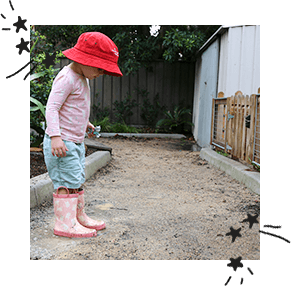
We love to share...
Get recipes & activity ideas delivered to your inbox!
